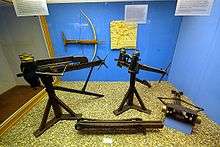Cheiroballistra
The cheiroballistra (Greek: χειροβαλλίστρα) or manuballista (Latin), which translates in all its forms to "hand ballista", was an imperial-era Roman siege engine. Designed by Hero of Alexandria and mostly composed of metal (the spring mechanism and the skeins), it shot bolts that were smaller than those in other forms of ballistae and generally made of metal. It was the next major improvement after the scorpio.[1]
 | |
| Part of a series on the | |
| Military of ancient Rome | |
|---|---|
|
|
|
| |
The name of the weapon is composed of the Greek words for 'hand' and 'shooter' implying that portable versions might also have existed, similar to crossbows.
References
- Warry, J. (1995). Warfare in the Classical World. P. 178 Salamander Books Ltd., London: United Kingdom. ISBN 0-8061-2794-5.
External links
- Article on ballista (shown), scorpio and cheiroballistra
- Reconstructing the cheiroballistra (archive)
- Drawing (archive)
- Greco-Roman artillery
This article is issued from Wikipedia. The text is licensed under Creative Commons - Attribution - Sharealike. Additional terms may apply for the media files.
